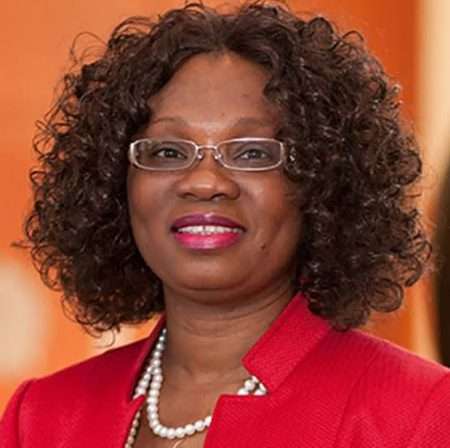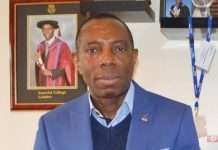
“I am proud to have overcome several challenges to develop a global prostate cancer research programme…l wake up to do what I love every day, which is working with a consortium of scientists globally to understand and address prostate cancer in men of African descent.”
– Prof. Folakemi Odedina
Prostate cancer is recognised as the most common cancer and the second leading cause of cancer death among men globally. Worse still, black men around the world have been found to be at a much higher risk of having and dying from the disease. Statistics actually indicates that black men are 50 per cent more likely to develop prostate cancer in their lifetime and twice as likely to die from the disease. One of the most influential experts combatting this scourge and its associated disparities is Prof. Folakemi Titilayo Odedina. She is a globally acclaimed pharmaceutical scientist and cancer specialist, with specific focus on predictors of cancer health disparities and cost-effective behavioural interventions to improve the health of minority populations, especially black men globally.
Odedina’s contributions to improving prostate health across the cancer care continuum include risk reduction, prevention, screening, timely detection, treatment and survivorship to improve economic, clinical and humanistic outcomes. She has continued to work with governments, experts and policymakers across the world to advance strategic initiatives to promote equity in cancer care.
Odedina presently serves in multiple roles at the Mayo Clinic Comprehensive Cancer Centre, Florida, USA. She is professor of Haematology/Oncology; associate director for the Centre for Health Equity and Community Engagement Research (CHCR); site director of CHCR Florida; and director of CHCR Global Health Equity Programme. She is also the research core director for the Florida Health Equity Research Institute, and the chairperson of the Research Committee for the African Organisation for Research and Training in Cancer (AORTIC).
Odedina previously served as professor of Pharmacotherapy and Translational research at University of Florida, which is affiliated with both the College of Pharmacy and the College of Medicine. She has directed over 40 research projects, mostly using community-based participatory approach, mixed-methods approach and translational behavioural research principles. She has also been a leader in training future scientists whose backgrounds are underrepresented in biomedical research.
Revolutionary initiative Odedina’s most notable contribution to the fight against prostate cancer, so far, is perhaps her historic founding of the Prostate Cancer Transatlantic Consortium (CaPTC) in 2005. The consortium, which is a clinical research group using genomic science and environmental etiology to explore disproportionate burden of prostate cancer among black men, was inspired by a major discovery she made earlier that year.
According to her, “I found out that the populations that are part of the Transatlantic Slave Trade came from different places in Africa, and journeyed to the Americas, Caribbean and Europe. Majority of the transatlantic slaves were taken from the Bight of Benin and Bight of Biafra – over 30 per cent. The Bight of Biafra and Benin regions are approximated to be the country Nigeria, which means that majority of the US Blacks are ancestral populations of Nigerians.”
She continued, “If we really want to understand the etiology of diseases, such as prostate cancer, we need to study populations that are genetically connected to fully understand the genetic and environmental contributing factors for the disease. For example, studying Africans, including Nigerians, and US Blacks will allow us to better understand the genetic contribution, as opposed to the environmental contribution for prostate cancer. This is why I founded the Prostate Cancer Transatlantic Consortium, popularly known as CaPTC, in 2005.
“Our primary goal is to figure out why black men all over the world are affected by prostate cancer, whether there are significant differences in the burden of the disease among different black men, and what can be done to reduce the disease in black men globally.”
Primarily funded by the US National Institute of Health, the National Cancer Institute and the Department of Defence, CaPTC has evolved into a global programme that includes increasing participation of people of African ancestry in clinical trials. It currently has over 50 institutions and hundreds of investigators, with consortium sites in Africa, Europe, North America and the Caribbean.
Brain drain to brain gain
Very significantly, Odedina has consistently ensured that her cancer research, education, training and outreach efforts have transformational impacts in Africa and Nigeria, in particular. In 2006, she received the Fulbright Research Scholar award to study prostate cancer in Nigeria. She worked closely with the then Minister of Health, Professor Eyitayo Lambo, making huge contributions to policies on cancer control in the country. She, in fact, conducted the first national cancer research project on cancer data reporting system in Nigeria and was one of the leading authors of the first National Cancer Control Plan (NCCP).
Also, Odedina’s findings and observations during that initial work in Nigeria have made her more committed to cancer control efforts in the country. According to her, “For me, it is a call to action, and we really need to accelerate biomedical research in Nigeria, including clinical trials. We cannot continue to use therapies that were developed and tested for other populations, such as Caucasians, and expect that these therapies will work perfectly well in Nigerians. The reason I keep coming back to Nigeria is to accelerate cancer biomedical research in Nigeria.”
Moreover, through AORTIC, the premier organisation for cancer research and training in Africa, Odedina works with other cancer scientists within and outside Africa to provide scientific leadership and direction for cancer research in Africa. Her committee is currently working on several goals including to develop a strong research agenda that will impact cancer outcomes in Africa. As the head of the research committee, she has mentored over 300 scientists.
Background and recognitions
Prof. Odedina was born on 21 January, 1965, in Abeokuta, Ogun State. She obtained her Bachelor of Science in Pharmacy at the Obafemi Awolowo University (OAU) (formerly known as University of Ife), Ile-Ife in 1986. In 1990, she started her PhD programme in Pharmaceutical Sciences at the University of Florida. She completed her PhD in 1994. Thereafter, she worked as assistant professor at West Virginia University before deciding to focus her research efforts on patients.
Odedina’s vast contributions to cancer and health equity research have earned her multiple wards and recognitions. In 1999, she received the “Wiederholt Prize for Best Published Paper Award for Economic, Social and Administrative Sciences (ESAS)”. In 2009, the American Society of Health-Systems Pharmacy and the Association of Black Health-System Pharmacists honoured her with “Leadership Award”, in recognition of her leadership in health disparities.
In 2016, her effort in training underrepresented minorities was recognised through the INSIGHT Into Diversity 2016 Inspiring Women in STEM Award. Based on her work in the area of clinical trials, she was awarded the “Living Legend Award” for innovations with health/economic impact during the 1st All Africa Clinical Trial Summit in 2017.













